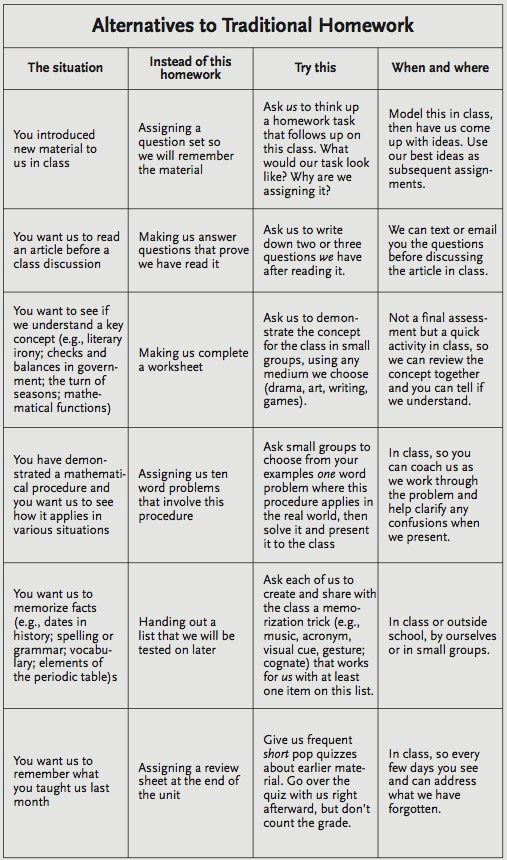Alternatives To Homework: A Chart For Teachers" .
As a Special Education Resource Teacher (SERT), I often take issue when my students are presented with large amounts of homework. They often fall behind in class, work exhaustively to play catch up, and end up feeling defeated. I especially take issue with it as a parent, when my own kids are inundated with outside of class time work. As a parent, I have experienced first hand the frustration of this cycle. Think about this: How many people go to work all day, and then come home to complete the tasks they didn't get finished that day at work - for hours? Who would want to? Many of us would be searching for another job that offered more life balance. We all need time to rejuvenate, and after work (and after school) is a time to do other things in life that are important and meaningful such as enjoying family time, social activities (organized or other), diving into learning about something of interest - for interest's sake. Of course there will be times when we need to put in some time outside of school or work, but not everyday - for the sake of "getting it done". I believe that skill practice should be done in class. I believe that assignments and activities should be done in class. The issue many teachers face is time. Often educators feel pressure to move forward in curriculum and less pressure to ensure skills have been learned before moving on to the next. I would rather see a focus on skill mastery than a completed check box indicating that the skill was taught. (Has it really been taught if students haven't demonstrated their true learning of the skill?)
Curriculum as it stands currently does not partner well with Universal Design for Learning. As the student advances through the grades, the curriculum in each one relies on the learning from the grade previous. I think teachers worry that if they don't get through the curriculum, they set students up for failure in the next grade. They feel a sense of pressure to complete them all skill requirements in a short amount of time ( at the secondary level, it's 5 months). Here's where I point out that the curriculum is a guide. It can be used to build skills that are foundational that are reinforced in later grades. Consider curriculum as the training an athlete receives. The teacher is the coach. The coach's job is not train the athlete to be an Olympian in a short time, but rather to work with them to bring them to a level where they can perform their best. School is one of the only areas where we rush kids. Can you imagine applying this same sense to learning to swim, or to playing a musical instrument? How could a person do the back crawl before they can float? How could a person play a song, before they know the musical scale, or timing, or understand rhythm? Why then do we feel this pressure to move forward before we know the skill is acquired at school? As a teacher, I'd much rather see learners slow down, take their time, and ensure skills have been acquired before moving forward to the next skill.
This of course, comes down to the topic of assessment. Universally Designed Assessment provides the freedom to be able to do so. Homework should not be a part of that assessment, however, homework that allows the student to think more deeply about the learning allows for deeper understanding and later, better application.
As Kathleen Cushman’s Fires in the Mind, outlines, alternatives to homework can do just this. Have a look at the chart below and see how you can help your students think more deeply about the learning done in class.
In the "Try This" column, each suggestion takes the learning to a deeper thinking level. It requires the students to show their thinking, their understanding, and their application in ways that go far beyond homework completion. You will also notice that much of this assessment is done in class! Here is my call to action: How can you, as an educator, re-think homework practices in your class to allow your students an opportunity to think more deeply about the learning? Would you need to even call it homework?


No comments:
Post a Comment